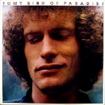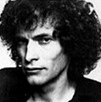Tony Bird: Tony Bird (CBS, 1976) Bird of Paradise (CBS, 1978)
Born in 1945 and growing up in Malawi, Tony Bird might be expected to have absorbed some unusual influences, and indeed he did. Long before Paul Simon's Graceland brought quirky African vibes to bear on Western folk, Bird created music of wonderful fusion and vibrancy. Prolific he isn't, three albums in thirty years, but both his CBS records (the second produced by Leonard Cohen stalwart John Lussauer) are at times hauntingly surreal, and both are ultimately rewarding experiences. Imagine that during an Eartha Kitt impersonation show, Bob Dylan dons a slinky number and proceeds to warble like the mannered, campy, old-fashioned girl. Unlikely in the extreme, but that is the closest aural analogy for Bird's unique delivery. It may have held him back from wider success, as would his brief period on CBS coinciding with the arrival of punk, but like many acquired tastes, the strange style becomes intoxicating. Bird's music is a curious mixture of local African cadences and Dutch Afrikaner traditions blended with a Greenwich Village sensibility.
On his self-titled debut album, he isn't so much a protest singer as an apologist for the sins of the whites in Africa, and an evocative chronicler of the beauty of homelands that belong close to his heart. A song such as "Athlone Incident" could easily be renamed "Liberal White Boy in Harlem" with its brilliant evocation of the sensibility that looking like the oppressor doesn't automatically mean that you are one. Think Gil Scott-Heron on a white guilt trip:
"O man I felt so helpless / And I trembled in my shoes / I felt like a sacrifice / For the years of bad, bad news / For how can you tell a man you're neutral / When he's always been misused / When he's never known nothing from others / But hatred and abuse."
"Outeniqua" is equally powerful in the way it brings home the beauty of his native landscape, with lines that evoke a sense of an African pastoral nature, and shows the power and depth of feeling with which he imbues his lyrics:
"The morning mist begins to lift / To release the further sound / And the golden grasses bowed with dew / Now are rising to the sun / The hillsides too are changing hue / As the shadows turn to flowers / And the mountain's steeps meet blue to blue / In a scarcity of clouds."
"Wayward Daughters" plows the same furrow as "She's Leaving Home." Had Mersey beat kitchen sink traumas been warmed with African sunshine, this might have been the result:
"But young daughters don't leave your home you know / Just so they can be alone / And wander in the big wide world / And they don't mean to make you cry / When you find they've said goodbye / And you wonder where and why they've gone."
Bird possesses that rare ability to suggest as much between lines as he infers in those he actually sings. 
Bird of Paradise develops these themes of compassion and travelogue, but exhibits a more personal and intimate side of his nature. In "Nothing But Time," he creates a mood of tremendously wistful sadness, with a melody to match:
"And her eyes were leopard green / And they burned within her smile / They almost spoke her mind / Without a move / But now those eyes are closed / And-a-faded from my sight / And now she ain't nothing but time."
A sense of political injustice is astutely evoked in "Black Brother," a plea for understanding beyond the immediacy of political compromises:
"Oh dear brother black brother caught up in the storm / Standing all alone in the white man's uniform / Turned against your brother in the hour of Africa's fate / What do you defend are you in the wrong place. / Yes dear brother black what a terrible fate / Your brothers are standing before you in hate / Now you kill for a third the pay of a white fighting man / Oh their blood is your blood it's getting late to understand / If you're not part of the answer / Well you're part of the scheme."
The plight of Iraqis being blown to smithereens while queuing for state-related jobs means this thirty-year-old song starkly reveals how slowly the world turns. Perhaps the most haunting song he has yet recorded, and the most exquisitely beautiful, is the moody and lyrical "The Mynah Birds." One for the cabaret at the end of the world, all sadness and lilting clarinet, crammed with lovingly well-crafted lines laced with unshed tears:
"Day has brought its labors dull / The soul has sought escape / And now at dusk and evening lamp I linger in a trance / Near big dim trees where mynah birds / Call out through the smog / As crowds of hurry homers / Scurry by the park / And am I the only one to hear / The mynah birds a-calling, in the dark? Oh how long till love is heard / In these times of bite and bark?"
After Bird of Paradise, Tony Bird didn't release another album till 1990, when Sorry Africa appeared on Rounder Records. It features revised versions of "Athlone Incident" and "Rift Valley" and the title track continues his dialog with his longings for a homeland that raises issues of guilt. It remains his only release on compact disc. Another album was trailered by Rounder in the mid-'90s, but that never surfaced. It seems unlikely now that Tony Bird may add much more to his trio of releases. Perhaps Columbia will bother to place his recordings in their Legacy series. As innovative and crafted efforts go, these are superlative labors that merit this. They deserve to reach a new and wider audience, but as with many fine things, they appear destined for the praise of a small coterie. If you like acquired tastes, then acquire these. Savor and share, and hope like Oliver for a little more.

